Risque
Le rapport « La situation mondiale des transferts monétaires » du CaLP Network indique que l’idée selon laquelle les transferts monétaires seraient plus risqués que d’autres formes d’aide est l’une des barrières principales à l’utilisation fréquente de cette modalité. Ces craintes sont liées à l’insistance de plus en plus franche des bailleurs concernant la lutte contre le terrorisme et contre le blanchiment d’argent, et à l’amenuisement des budgets destinés à l’assistance humanitaire. Le travail du CALP Network sur cette problématique vise à combattre les idées reçues, à faciliter la collaboration et à partager les apprentissages afin de veiller à ce que les transferts monétaires soient systématiquement considérés, tout comme d’autres modalités, en fonction des données probantes disponibles sur les risques réels de toutes les modalités.
Priorités actuelles
Plusieurs organisations travaillent actuellement sur les risques entraînés par les transferts monétaires. Le CALP Network cherche à identifier les synergies entre acteurs, à éviter les duplications et à définir des priorités communes sur lesquelles nous pourrions agir plus efficacement en groupe. Avec le PAM, le CALP Network co-dirige l’élément Risques, priorité du chantier du Grand Bargain sur les transferts monétaires.
Contenu présenté

Podcast: Will risk aversion hold us back from realizing the potential of CVA?
Podcast
Episode 1 of the CashCast, exploring how attitudes to risk have impacted the use of CVA in the Middle East and North Africa region.

Transferts monétaires et risques : ce qui se passe sur le terrain, reste sur le terrain (et pourquoi c’est un problème)
Blog Post
En octobre 2019, le CALP Network a facilité à Douala, au Cameroun, une réunion de partage d’expériences sur les risques liés à la protection des bénéficiaires dans les interventions monétaires. Cette réunion restreinte, organisée dans le cadre d’une série de rencontres dans différentes régions, a permis à 25 travailleurs humanitaires d’Afrique de l’Ouest et du Centre,...

Webinar: Data sharing in CVA: ethics, ownership and privacy
Event
Thematic lead
Contenu récent
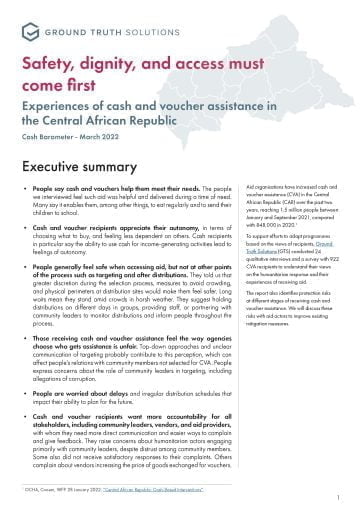
Safety, Dignity, and Access Must Come First: Experiences of Cash and Voucher Assistance in the Central African Republic
Report
Aid organisations have increased cash and voucher assistance (CVA) in the Central African Republic (CAR) over the past two years, reaching 1.5 million people between January and September 2021, compared with 848,000 in 2020. To support efforts to adapt programmes based on the views of recipients, Ground...

DG ECHO Thematic Policy Document on Cash Transfers
Policy paper
DG ECHO released its Thematic Policy document on Cash Transfers in March 2022. The document provides guidance primarily to DG ECHO’s partners and staff, but also to the wider cash community with the objective of collectively enhancing the quality and efficiency of cash programmes and of humanitarian...
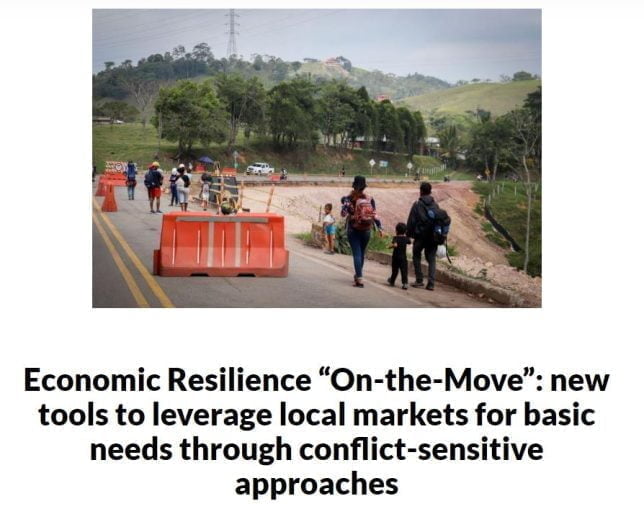
Economic Resilience “On-the-Move” – New Tools to leverage local markets for basic needs through conflict-sensitive approaches
Guidelines and Tools
See the publication here A special look at Cash and Local Markets for Social Cohesion Local market actors affected by (natural) disasters, pandemic lockdowns with movement restrictions and income loss – generally in Fragile Contexts – play a critical role in contributing towards communities’ basic...
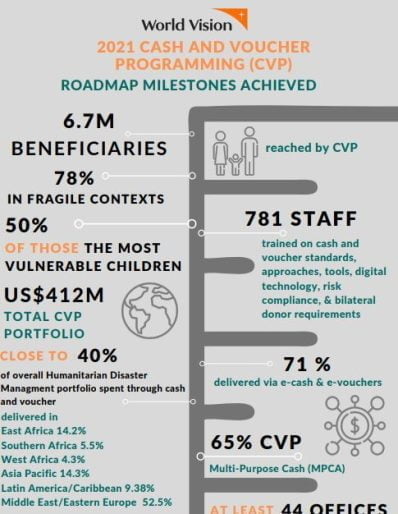
2021 Cash And Voucher Programming (CVP) Roadmap Milestones Achieved
Report
Summary Report of World Vision’s global progress report and milestones (against WV’s global Cash Roadmap Strategy) in Cash Voucher Assistance (Cash Voucher Programming-CVP) facilitated by World Vision in over 44 countries, reaching more than 6.7 Mio vulnerable people (78 % in Fragile Contexts) in...

Field Handbook for Rental Housing Market Assessment – Latin America and the Caribbean
Guidelines and Tools
The International Federation of the Red Cross (IFRC), the Norwegian Refugee Council (NRC), the International Organization for Migration (IOM), the United Nations High Commissioner for Refugees (UNHCR) and REACH with the support of CashCap/NORCAP and the collaboration of the R4V Shelter Sector, established...
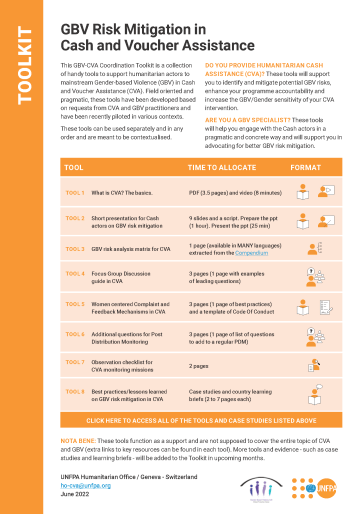
GBV Risk Mitigation in Cash and Voucher Assistance
Guidelines and Tools
This GBV-CVA Coordination Toolkit is a collection of handy tools to support humanitarian actors to mainstream gender-based violence (GBV) in cash and voucher assistance (CVA). Field oriented and pragmatic, these tools have been developed based on requests from CVA and GBV practitioners and have been...
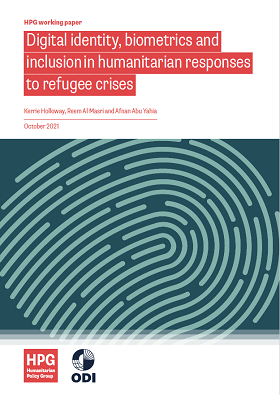
Digital identity, biometrics and inclusion in humanitarian responses to refugee crises
Report
Digital identity and biometrics have long been divisive topics in the humanitarian sector. On the one hand, they have the potential to be more inclusive and reach people in need at scale due to perceived efficiency gains. A legal identity for everyone as part of the Sustainable Development Goals (SDGs)...
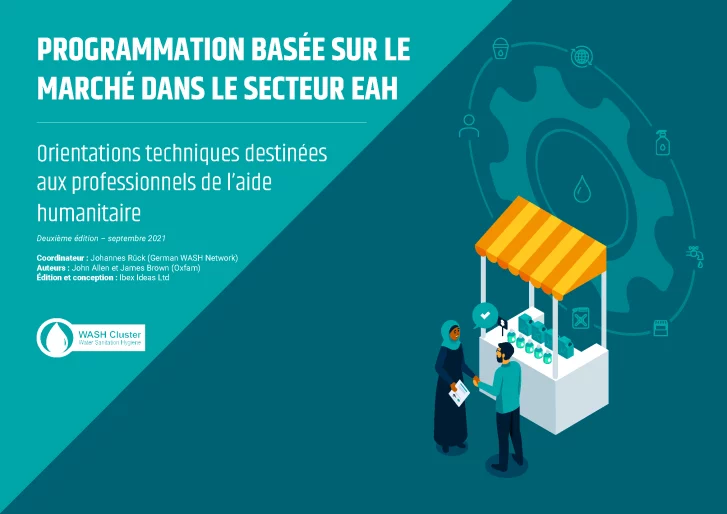
Programmation basée sur le marché dans le secteur EAH
Guides et outils
Le but de ce document est de fournir des conseils pratiques sur la programmation basée sur le marché (MBP) dans les réponses humanitaires WASH. Cette orientation est destinée à : Praticiens WASH humanitaires Praticiens travaillant avec les transferts monétaires et les marchés Équipes de soutien...
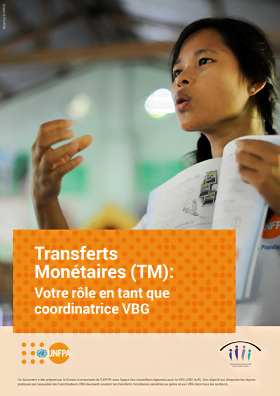
Transferts Monétaires (TM): Votre rôle en tant que coordinatrice VBG
Guides et outils
Le Bureau humanitaire de l’UNFPA et la Domaine de responsabilité VBG ont élaboré ces orientations sur le thème « TM – Votre rôle de Coordinateur des VBG » à l’intention des responsables et des partenaires du groupe de coordination violence basée sur le genre (VBG) intervenant dans des...
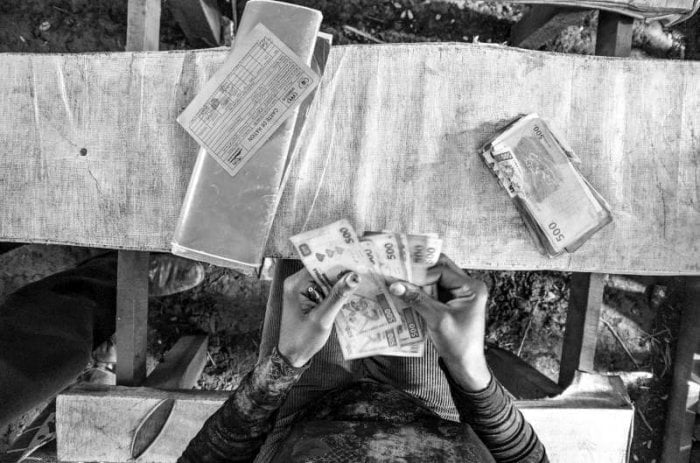
Screening recipients of humanitarian cash and voucher assistance: necessary precaution or wasted resources?
Blog Post
Is screening the recipients of humanitarian cash and voucher assistance an effective way to mitigate against the perceived diversion risk that cash represents? If yes, how? If not, why are conversations growing on the topic? In a recent report for Oxfam and Bond, Nina Newhouse & colleagues from the London...

Cash and Voucher Assistance (CVA) Feasibility and Risk Analysis Sudan
Case Study
Summary findings UN agencies and NGOs are all in the process of starting up or scaling up cash transfers with many other agencies active in the Cash Working Group while WFP is considered as the biggest Cash actor. There is a strong direction from the government at the national level to use cash based...
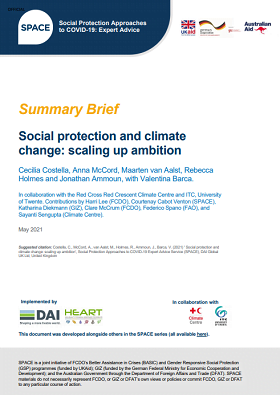
SPACE Social protection and climate change: scaling up ambition (Summary Brief)
Policy paper
Climate change, once perceived as a long-term environmental issue, is now an immediate threat to safety and prosperity, especially for the most vulnerable people that are hit hardest by increasing weather extremes. The impacts cannot be managed just by reducing greenhouse gas emissions or by small tweaks...

GBV Risk Mitigation: An Analysis of the CARE Somalia Integrated Relief &Recovery Program (ISRP) Multipurpose Cash.
Report
This is a learning brief that highlights the GBV risk mitigation analysis of CARE’s ISRP Project (Economic Recovery Sector ) funded by USAID’s Bureau for Humanitarian Assistance (BHA), The CARE Project was applied as one of the case studies for the inter-agency Somalia GBV Risk mapping in CVA projects.
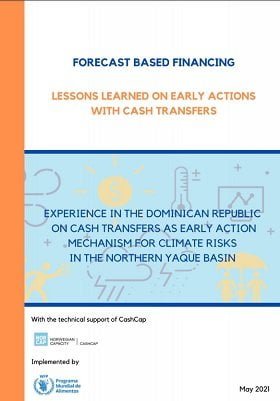
Forecast based financing – lessons learned on early actions with cash transfers
Report
The objective of the document is to present the lessons learned related to the implementation of early actions with cash transfers as part of the forecast-based financing mechanism implemented by the World Food Programme in the Yaque del Norte watershed in the Dominican Republic.
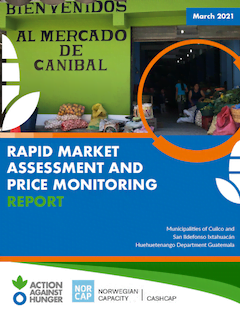
Rapid Market Assessment and Price Monitoring Report – Huehuetenango Department Guatemala
Report
Methodology: This rapid assessment of markets and prices was based on an adapted version of the IFRC’s Rapid Assessment for Markets, elements of the EMMA toolkit’s market system approach and the consortium of NGO’s price monitoring format. The methodology was chosen to give a basic and rapid...
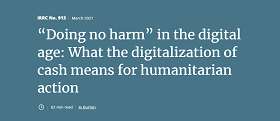
“Doing no harm” in the digital age: What the digitalization of cash means for humanitarian action
Policy paper
Cash transfers have changed the way the humanitarian sector delivers assistance, and at the same time, digitalization is changing the way our world works in fundamental ways. The digitalization of cash means that the simple click of a button can put money in the hands of hundreds of thousands, if not...

Sudan – Gedaref Joint Cash Risk assessment
Report
Since the crisis in the Tigray region of Ethiopia in November 2020 over 60,000 people have sought refuge in neighbouring Sudan and were mostly accommodated in camps re-established in Gedaref State. Cash is has been utilised as a response modality and is being considered further by several agencies. This...

2020 Cash and Voucher Programming (CVP): Roadmap and milestone achieved
Report
In 2020, World Vision has implemented cash and voucher programming like never before – not least due to the COVID-19 pandemic and related social protection transfer scale-ups. From 2019 to 2020, we have seen a 28 % increase of our cash, voucher based programming, moving towards enabling affected...

Towards shock-responsive social protection: lessons from the COVID-19 response in Bangladesh
Report
The COVID-19 crisis is likely to have a staggering impact on poverty in Bangladesh. This report documents the social protection responses by the Government of Bangladesh to mitigate the impact of the pandemic on vulnerable populations. Analysing factors that enabled and constrained the effectiveness of...

Pinning Down Moving Targets: Research Note Medium-term priorities for cash assistance in Lebanon
Report
Whilst most humanitarian responses across the globe have had to navigate the impact of the Coronavirus pandemic, in Lebanon the challenges related to COVID-19 emerged on top of an unprecedented protest movement, political instability, a rapid deterioration of the economy and the increasingly protracted...



